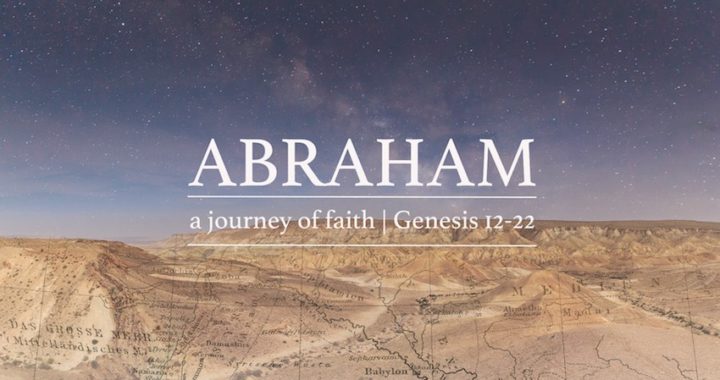What does it mean to be a Hebrew?
Abraham established the standard of what it means to walk in faith with the living God. Christians and Jews alike whole-heartedly agree that the life of Abraham is a model of what it means to truly believe in God. We see evidence of this in the following Old Testament quote which is found in the New Testament:
Even so Abraham believed God, and it was reckoned to him as righteousness. Therefore, be sure that it is those who are of faith who are sons of Abraham. – Galatians 3:6-7
This quote from Genesis 15:6 reminds us that faith is the basis of believing in and knowing God. Those who truly believe God, as Abraham did, are called sons of Abraham.
It is an honor to be called a son or daughter of Abraham, however, do we really understand what it means to be a true child of Abraham? This week’s Torah Portion provides many examples of what it means to walk in faith as Abraham did.
The Journey of Abraham
As we open our Bibles to this week’s Scripture reading, we read about the call of God to Abraham (Abram) to depart from his home country and to journey to the Promised Land:
Now the LORD said to Abram, “Go forth from your country, and from your relatives and from your father’s house, to the land which I will show you; and I will make you a great nation, and I will bless you, and make your name great; and so you shall be a blessing; and I will bless those who bless you, and the one who curses you I will curse. And in you all the families of the earth will be blessed.” – Gen. 12:1-3
The LORD promised to lead Abraham to a new land, to make him a great nation, to bless him, and then the LORD added that all of the families of the earth would be blessed in him. It was an amazing promise in which Abraham believed God and obeyed.
When God instructed Abraham to leave his country, He did so by using the famous words in Hebrew לך לך – Lech Lecha, which is a difficult phrase to directly translate into English. The meaning of this phrase is actually quite straightforward but the translation is challenging. A literal translation of this phrase is “Go you!” in the form of a command. The LORD was clearing instructing Abraham to leave his present location, however, the manner in which the LORD instructed Abraham to leave is very descriptive.
The LORD’s instructions to Abraham to leave and to go to the Promised Land included three distinct entities from which Abraham was to depart: “Go forth from your country, and from your relatives and from your father’s house, to the land which I will show you;…” (Gen. 12:1) The LORD could have just told Abraham to leave and go to the country that He would show him but He didn’t. The LORD specifically mentioned three entities from which Abraham was to depart:
-
- His country
- His relatives
- His father’s house
Why did the LORD stress these three entities for Abraham to leave behind?
The Call of Abraham
God was not inviting Abraham to an all-expense paid holiday vacation for a few weeks. Neither was God simply calling Abraham to change locations. God was calling Abraham into a journey of faith with the living God which demanded a complete abandonment to all that Abraham was familiar with and a complete commitment to the LORD.
God first instructed Abraham that he was to leave his country. A country is a place wherein one identifies as a citizen. Abraham was born in Ur of the Chaldeans and was dwelling in Haran of Mesopotamia when God spoke to him. Abraham understood the culture and spoke the language of the place which he knew as home. God called Abraham to leave his country and affiliating citizenship behind in order to dwell in a new Land.
The second entity from which God called Abraham to leave was his relatives. The Hebrew word used here for relatives is the word מולדת – moledet, which literally means “birth” or “birthplace” but is also used of one’s family, those who are closely connected to a person. This seems to be what is intended in this context as God called Abraham to not only leave the country that he knew but also to leave behind the people associated with his homeland. This obviously did not include his wife, Sarah. Abraham took Sarah along with his nephew Lot when he left Haran, however, Lot seemed to only be a constant source of trouble and turmoil to Abraham as he entered the new Land.
The third entity from which God called Abraham to leave was his father’s house. Abraham’s father, Terah, was still alive at the time that Abraham received this call from the LORD (Gen. 11:27-32). In a literal sense, Abraham had to leave the house or association with his father in Haran, however, the text and context of these verses seem to imply a more serious departure from the house of his father. The family inheritance is associated with the phrase “your father’s house” and Abraham, as the firstborn of his father (Gen. 11:26), would have received a double portion. God was calling Abraham to leave his father’s house behind along with all of the benefits that went with it, including the inheritance of the firstborn.
The Blessing of Abraham
God had called Abraham to leave everything behind but at the same time God had promised to bless him beyond measure. In place of his former country, God promised to bring Abraham to a new Land which would be his inheritance (Gen. 15:7). In place of his relatives and countrymen, God promised to make Abraham into a great nation (Gen. 12:2). In place of the inheritance of the firstborn and all of the benefits of his father’s house, God promised to bless Abraham (Gen. 12:2) and to give him great riches (Gen. 15:1). We also know from the biblical account that the LORD was faithful to fulfill every promise that He made to Abraham (Gen. 13:2. 25:1-8).
God called Abraham and invited him to leave everything in order to follow Him and Abraham obeyed. This is why Abraham is our standard today of what it means to have faith in God. Abraham knew the cost of following God in complete obedience and faithfully walked with God as God spoke to him.
Abraham the Hebrew
Abraham is the first one in the Bible to be called a “Hebrew” (Gen. 14:13), which in the Hebrew language is written and pronounced עברי – ivri. There is no reason given for why he is called a Hebrew but the meaning of this word provides the most logical explanation. The word עברי – ivri, comes from the Hebrew root עבר – avar, meaning “to cross” or “go beyond.” Since Abraham came from Haran and Ur, he had to cross the Great River, the River Euphrates, in order to arrive to the Land which the LORD showed him, the land of Canaan. Therefore, Abraham was literally a Hebrew, meaning one who crossed over the Great River.

A Modern-Day Hebrew – Crossing the Great River
When Yeshua walked this earth approximately 2000 years ago, He challenged His disciples, and all who would follow Him, with a similar call that God gave to Abraham:
Then Yeshua said to His disciples, “If anyone wishes to come after Me, he must deny himself, and take up his cross and follow Me. For whoever wishes to save his life will lose it; but whoever loses his life for My sake will find it.” – Matthew 16:24
Just as God called Abraham to leave behind country, relationships, and the earthly inheritance which rightfully belonged to him, Yeshua calls each one of us today to deny ourselves, take up our cross, and follow Him with complete abandonment.
I don’t want to imply that if one does not leave his home country or his family that he or she is not a disciple of Yeshua. The call of Yeshua to His disciples and to us today is a call of denying ourselves and following Him. This call and our response to Him will be unique just as each one of us are unique in His eyes. The ultimate desire of God is for each person on earth to become a “Hebrew” as Abraham did and cross over to the other side of the Great River in complete faith and total dependence on God alone!
Shabbat Shalom!
If you enjoyed reading this article, share it today with friends! We also invite you to sign up for our weekly Torah Portion commentary on the sidebar to the right.
Help keep our weekly commentaries free and available to all. Click here to donate today:
Torah Portion: Gen. 12:1 – Gen. 17:27
Haftara: Isaiah 40:27 – Isaiah 41:16
Return to Torah Portion Homepage
Copyright Jewels of Judaism. All rights reserved 2018



Very insiteful, thanks for the article
Excellent Article! Thank you!